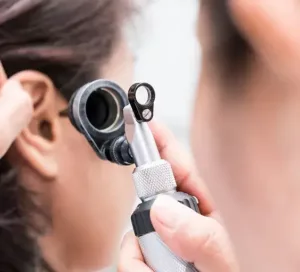After an ear wax removal procedure, some side effects might occur which could cast doubts about the success of the procedure. But many times, side effects do not mean that an ear wax removal procedure was not successful. They are just what they are – side effects. Some of these side effects include tinnitus, pain in the ear, vertigo, trauma to the ear, infection, and even damage to the eardrum. Some side effects like tinnitus and vertigo can be transient and go away after a short while. At other times they persist.
Although side effects like tinnitus could sometimes be particularly nerve-racking, it is important to note that on most occasions the symptoms are transient.
Book for your safe ear microsuction procedure here

What is Tinnitus?

Tinnitus is the feeling of ringing, thumping, buzzing or other noises in one or both ears in the absence of an external source of noise or sound. Tinnitus is a common problem and is more prevalent in older adults. In most cases, tinnitus is caused by an underlying condition, such as ear injury, age-related hearing loss, and sometimes a problem with the circulatory system. The blockage from ear wax removal can cause tinnitus and if this is the case, it should ideally go away after the procedure.
On very rare occasions the noise from the suction or irrigation machine may induce tinnitus which as mentioned earlier, tends to last for only a few hours to days for most people.
On very rare occasions the noise from the suction or irrigation machine may induce tinnitus which as mentioned earlier, tends to last for only a few hours to days for most people.
Types of Tinnitus
Tinnitus could broadly be classified into pulsatile and non-pulsatile tinnitus.
Pulsatile Tinnitus: This is less common and can be further classified into pulse-synchronous and non-pulse synchronous pulsatile tinnitus.
- Pulse synchronous pulsatile tinnitus arises from problems with the vascular system or simply the circulatory system. People with pulse synchronous tinnitus often hear rhythmic thumping or throbbing in one or both ears. This thumping is usually in sync with a patient’s heartbeat.
- Non-pulse synchronous pulsatile tinnitus is associated with middle ear and palatal muscle twitching or auto response. It comes with a whooshing sound which may not be in sync with the patient’s heartbeat, but it has a rhythm which could be regular or irregular in the ear and is often very unnerving.
Sometimes, pulsatile tinnitus of both types could be an early pointer to a more serious underlying condition. For this reason having pulsatile tinnitus after ear wax removal is possible if the underlying condition is not ear wax related.
Non-pulsatile Tinnitus: This is the more prevalent type. The causes and/or source(s) of non-pulsatile tinnitus remains a subject of speculation. Current hypothesis revolves around neural malfunction of the cochlea or the auditory nerve. It usually comes in the form of ringing, buzzing, and or humming sound in the ear.
Causes of Tinnitus after ear wax removal
- Noise Damage: For procedures whose mechanism produces loud sound during ear wax removal, one of the possible outcomes is tinnitus as the machine sound may continue to ring in the ear. To guard against this, our experienced audiologist would make the duration of the procedure as short as possible, and use alternative procedures to microsuction if you already suffer from tinnitus or hyperacusis (sensitivity to everyday sounds).
- Injuries during procedure: If an injury was sustained during the procedure due to the use of a discredited ear wax removal method or the general risk of ear drum perforation, tinnitus could result.
- Hearing Loss: Hearing loss generally is one of the major sources of tinnitus. The ear loses the ability to pick external sounds, and instead produces phantom noises from within. During ear wax removal, injuries, noise damage or other problems might result in hearing loss which would in turn cause tinnitus to occur.
Predisposing factors for possible tinnitus after ear wax removal
- Age: Tinnitus is more likely to occur after ear wax removal in older adults than in younger people.
- Discredited Ear Wax Removal Methods: Some methods of ear wax removal such as ear syringing have been discredited because of the damages they can cause to the ear afterward, such as tinnitus.
- Prior Injury to the ear:If there were prior injuries to the inner ear before the procedure, there is a very high chance of tinnitus occurring after the procedure. To reduce the chances of this happening, the experienced audiologist would choose a safer procedure. Wet procedures such as ear irrigation or the discredited ear syringing are not suitable for ear wax removal on ears with prior injuries. Ear microsuction, or Endoscopic suction ear wax removal are preferred in such situations as they go straight to the wax and suck it out without causing further damage to the ear canal or ear drum.
Potential Risk of Tinnitus posed by different ear wax removal methods
The risk of tinnitus posed by an ear wax removal method is many times directly inherent in its mode of operation.
- Ear Syringing and Tinnitus: Firstly, ear syringing is a discredited ear wax removal method because of its very high potential to cause ear damage. Ear syringing will very likely cause lacerations or injuries in the ear because the water is applied using manual pressure, and the clinician cannot view your ear canal while conducting the procedure like they can when performing microsuction.
Sometimes, there could be temporary tinnitus after ear syringing, and the tinnitus would go away after a few hours, but at other times, it could last for much longer depending on several factors, including the type of injuries sustained and what part of the ear the damage was done to. Being a discredited method, experienced professionals no longer offer ear syringing. - Ear Irrigation and Tinnitus: Ear irrigation is relatively safer than ear syringing because the system is mechanized so that the pressure of water being squirted into your ear canal can be controlled. However, being a wet process, it is not advisable to have this procedure if you have a history of a recent ear infection or injury. Having tinnitus after ear irrigation, therefore, is possible but is less likely to occur when compared to ear syringing.
- Ear Microsuction and Tinnitus: Microsuction Ear Wax Removal is a preferred procedure because it provides a view of what is going on in the ear, goes straight to the earwax, sucks it out, and has contact with little or nothing else. Tinnitus is far less likely to occur from this procedure, but there is still a little chance it can occur.
This is because the sound produced by the microsuction machine is often loud and can cause noise-induced tinnitus. - Endoscopic Suction Ear Wax Removal and Tinnitus: Again, this is one of the best procedures available as it is safe, just like Ear Microsuction.
It provides a view of what is going on in the ear, and there is minimal contact with anything else other than the wax or debris being sucked out. Tinnitus is also very unlikely to occur after this process, except where there are predisposing factors. - Ear candling and Tinnitus:
Ear candle manufacturers have made several claims of benefits derivable from using ear candles. But there is no scientific proof or evidence to show that ear candles help with ear wax removal.
Ear candles have instead proven to be dangerous to the ear. Some of the potential risks of using ear candles include: puncturing of the eardrum, blocking of the eardrum with candle wax, bleeding from injuries, contracting secondary infections, causing damage to the middle ear, etc. With these many risks, it is understandable that tinnitus will always be a potential side effect of this. And if you wonder if ear candling can help with tinnitus, clearly, it cannot.
Get professional help for your delicate ears.

Managing Tinnitus after ear wax removal
If handled professionally, tinnitus and other symptoms of ear wax build-up would typically go away after an ear wax removal procedure. But even when tinnitus is noticed after a successful ear wax removal procedure, it should go away after a short while. If tinnitus persists after ear wax removal, the first advice is to avoid the temptation of inserting anything into the ear in a bid to reduce discomfort caused by it. Secondly, don’t be anxious as the tinnitus is usually transient. If the tinnitus persists after 72 hours, you can contact your ear wax removal clinic or GP for further advice.
Frequently Asked Questions
Yes, but only if it was caused by earwax buildup. If you had tinnitus as a result of earwax buildup, your tinnitus should go away after the ear wax removal procedure.
Tinnitus after an ear wax removal procedure should go away after a few hours (12 – 48 hours). If tinnitus lasts longer than this after an ear wax removal procedure, you should see your ear wax removal clinic or your GP for further advice.
Yes and no. If tinnitus was caused by ear wax build-up, ear wax removal should help with stopping the tinnitus. However, if your tinnitus is due to another underlying factor you may not experience the same result.
Yes. Depending on many factors including age, the ear wax removal method used, handling and presence of previous injuries or infections, ear wax removal can cause tinnitus.
It is possible to experience any type of tinnitus after ear wax removal, although non-pulsatile tinnitus is more prevalent.
No. It is very unlikely for ear candles to help with tinnitus. If anything, it could make tinnitus worse. Ear candling for tinnitus is a wrong practice.
References:
- Pulsatile Tinnitus
https://www.pennmedicine.org/for-patients-and-visitors/patient-information/conditions-treated-a-to-z/pulsatile-tinnitus
Accessed, Sept. 15, 2023 - Causes and types of Tinnitus
https://www.ncbi.nlm.nih.gov/pmc/articles/PMC7927175/
Accessed, Sept. 15, 2023 - Effect of age on tinnitus
https://www.ncbi.nlm.nih.gov/pmc/articles/PMC3227161/
Accessed, Sept. 15, 2023




